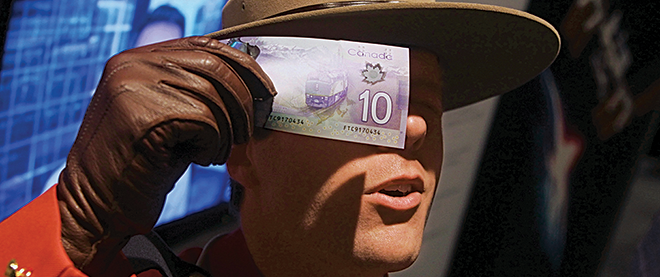Good news, bad news
A hero during the Bearskin Airlines crash, and Supreme confusion in the courts
Christinne Muschi / Reuters
Share

Good News
Courage under fire
A 29-year-old man is being hailed a hero after pulling a fellow passenger from the wreckage of a Bearskin Airlines plane that crashed en route to Red Lake, Ont., from Sioux Lookout, Ont. The man, whose name had not been released as of early this week, rescued a 50-year-old woman and called 911 just before the 19-seat turboprop plane burst into flames, killing both pilots and three other passengers. The cause of the crash is still unknown, but courage is alive and well.
Birth brains
Pregnant women who exercise for 20 minutes three times a week improve the brain function and capacity of their unborn children for life, according to Montreal researchers. They found that eight-day-old infants whose mothers had worked out often had brains as active as eight-month-old babies. Meanwhile, American researchers believe they have discovered the cause of sudden infant death syndrome. Abnormalities in the part of an infant’s brain stem that controls breathing, heart rate, temperature control and blood pressure may be to blame.
Cell phones for humanity
By 2019, more than 9.3 billion cellphones will be in use around the world, meaning mobile devices will be more accessible than clean water and toilets in some regions. That’s not necessarily a bad thing. As the New York Times recently noted, smartphone apps are increasingly being used to help people access education and health services, and participate politically—key precursors to eradicating poverty. Thanks to technology, the digital divide is narrowing fast, helping to solve some of the world’s most intractable problems in the process.
Fresh brew
Tim Hortons is finally introducing a cardboard sleeve for its coffee cups after years of forcing patrons to gingerly grip their piping-hot beverages with a thumb and forefinger. It’s also testing a new dark-roast blend—the first time it’s messed with its recipe in nearly 50 years. Purists will complain about the Starbucksification of a Canadian icon, but given the growing stakes in the $3-billion industry, including the successful rollout of McDonald’s McCafé two years ago, Tim Hortons is wise to sharpen its defence.
Bad News
Supreme confusion
The appointment of semi-retired Federal Court of Appeal judge Marc Nadon to the Supreme Court of Canada continues to create a constitutional mess. Nadon has been quarantined from his fellow justices after a Toronto lawyer challenged his eligibility, arguing that he was unable to fill one of three Quebec seats on the court because of his federal court background—a position Quebec has also taken. He was therefore absent this week when the country’s highest court heard arguments about Senate reform—a question that Quebec wants decided with a full bench.
Clicking train bombs
A 90-car train carrying oil from the Bakken shale deposit derailed in rural Alabama, sparking an inferno. No one was hurt, but the accident was eerily reminiscent of the derailment and explosion of the train that razed the Quebec town of Lac-Mégantic this summer, killing 47. As the North American oil industry increasingly turns to railroads to move crude, more needs to be done to prevent tanker cars from coming off the tracks—or, at the very least, making sure they don’t explode.
Deaf ears
Teenage education activist Malala Yousafzai’s recent tour of the West has made her an international celebrity. But it has yet to spark a change in her native Pakistan. Authorities there recently banned Yousafzai’s book I Am Malala from 40,000 school libraries, branding it a “tool for the West.” Some have even questioned the story behind her 2012 shooting at the hands of a Taliban gunman, suggesting it was staged by Western powers. One problem: Maulana Fazlullah, the new leader of the Pakistani Taliban, reportedly ordered the assassination attempt.
Start-smoking aids
Makers of e-cigarettes are marketing to children by using cartoon characters and fun flavours, the director of the U.S. Centers for Disease Control and Prevention told USA Today. The CDC says 10 per cent of U.S. middle and high school students tried smoking e-cigarettes in 2012, twice as many as a year earlier. A leading Canadian medical journal has raised similar concerns. E-cigarettes may be less harmful than real ones, but clearly, the best option is to avoid altogether getting kids hooked on nicotine.